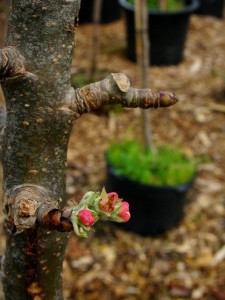
Have you ever noticed the difference between an apple you buy at Stop and Shop in June and a fresh-picked Massachusetts-grown apple in September? It’s remarkable how much better the flavor and texture is this time of year! If you are tempted to plant your own, why not take the opportunity to sample the range of fruit that might be available to plant.
When choosing apples to grow at home there are a number of important considerations:
- Space: An un-grafted tree grown from seed can reach 20′ tall and wide! With modern grafting techniques, however, pomologists can control the size of the tree. Dwarf and semi-dwarf trees are generally preferred for growing apples at home. Or, consider an espalier (A tree trained flat into a formal shape) these can be planted on a wall, or a post and wire system.
- Exposure: Fruit trees need lots of sun to produce! If the spot you have selected for you tree doesn’t have full sun, its unlikely that you will get a good crop of apples.
- Pruning: Apples require yearly pruning to produce the best crop. If you love pruning, apples are a lot of fun! It’s a good idea to follow a reference, Umass and Cornell have great extension services that have excellent websites. Take a peek at http://www.gardening.cornell.edu/fruit/homefruit/3treefruit.pdf and www.umass.edu/fruitadvisor/pdf/RINLA2011.pdf these are both great resources for apple culture.
- Pest & Disease issues: All fruit trees are susceptible to a myriad of pests and diseases. To limit the amount of spraying needed to produce quality fruit, always plant cultivars that are touted to be resistant to those problems.
- Pollination: Apples are not self-pollinating. This means that in order to set fruit, more than one variety must be planted that blossom at the same time. Do your research! Make sure the varieties you chose to plant overlap their bloom period, otherwise its possible neither tree will bear fruit.
- Harvest Time: Depending on the variety, apples will ripen and can be harvested from late August all the way until frost. Consider planting varieties that will provide fruit in succession.
- Use: Choose varieties that suit your needs. Do you like to make apple sauce and butters? ‘McIntosh’ and varieties like it are ideal for that purpose. ‘Braeburn’ makes a great pie. ‘Jonamac’ is delicious eaten out of hand. Cider is another great way to enjoy apples, try combining varieties to create a ‘House Blend’.
We stock many apples at the nursery, and are happy to source individual varieties you might be interested in. Whether a mature tree is needed for your project or a young containerized plant is ideal, we can provide a plant that will fit the need.
